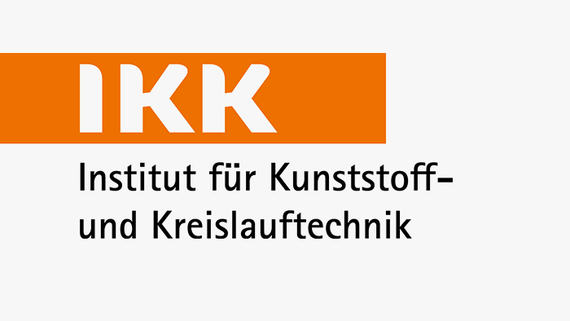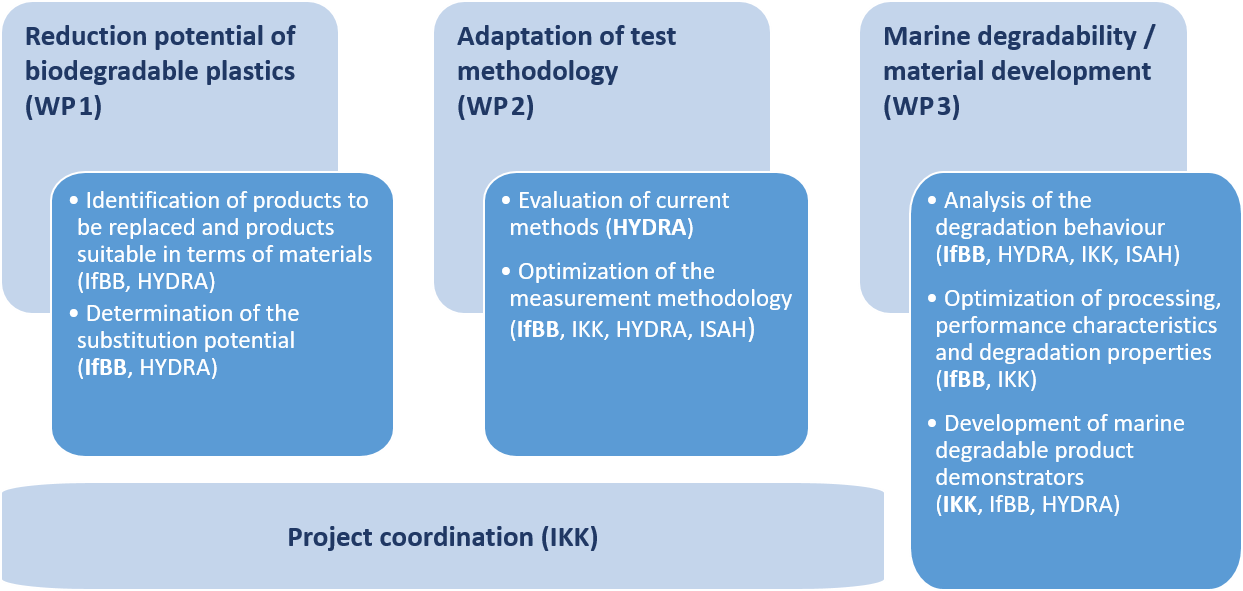Project partners
Institute of
Plastics and Circular Economy

In its research work, the Institute of Plastics and Circular Economy considers the entire life
cycle of bio-based and conventional plastics, from material development via application-oriented
implementation to sustainability assessment. In this thematic complex, the focus lies on
recycling and resource efficiency.
In addition to classical plastics technology, the institute is equipped with extensive materials
testing (destructive and non-destructive methods) and chemical analysis for the qualitative and
quantitative characterization of polymer materials.
Institute of Plastics and Circular Economy, Produktionstechnisches Zentrum der Leibniz
Universität Hannover / PZH, An der Universität 2, 30823 Garbsen, Prof. Dr.-Ing. Hans-Josef
Endres, +49 511 762 13302, endres@ikk.uni-hannover.de
HYDRA
Marine Science GmbH

As a member of the HYDRA network we use our decades of experience in the aquatic field to support
research partners, media and interest groups with solutions.
Our missions take us into all waters, from high alpine lakes, to the Dead Sea; into streams and
rivers; from Antarctica to the Mediterranean Sea and the tropical reefs of the Caribbean,
Australia and Southeast Asia. Our experience in such diverse ecosystems also benefits our
partners and customers.
Since more than a decade HYDRA has accumulated a wealth of expertise in testing the performance
of biodegradable polymers and blends in the aquatic environment. Together with academic
partners, public institutions, NGOs and industry we have been involved in research projects,
workshops, expert hearings, outreach and the development of international standard tests.
HYDRA Marine Sciences GmbH, Steinfeldweg 15, 77815 Bühl, Dr. Miriam Weber, +49 7223 9949560, info@hydramarinesciences.com
IfBB - Institute for Bioplastics and Biocomposites

At the IfBB - Institute for Bioplastics and Biocomposites (Faculty II - Mechanical and Bioprocess
Engineering of the Hannover University of Applied Sciences and Arts), research on bio-based as
well as conventional plastics and composites is the main focus, while taking sustainability into
account. The aim is application-oriented material development, optimised processing and the
adaptation of new materials to existing processes. In cooperation with the Application Centre
HOFZET of the Fraunhofer WKI, the IfBB has access to a state-of-the-art technical centre for
bioplastics and composites.
Mechanical, thermal and rheological testing laboratories as well as imaging techniques are
available for material testing. Other important research topics include the pollution of the
oceans by plastics and the associated marine degradability of biomaterials, as well as the
recycling of plastics and the use of residual materials for use in biomaterials. Sustainability
assessments according to ISO 14040/44 complete the field of activity of the IfBB.
Hochschule Hannover, University of Applied Sciences and Arts, IfBB - Institute for Bioplastics
and Biocomposites, Heisterbergallee 10A, 30453 Hannover, Dipl.-Ing. (FH) Marco Neudecker,
0511-9296-2232, marco.neudecker@hs-hannover.de
Institute of Sanitary Engineering and Waste Management

The Institute of Sanitary Engineering and Waste Management (ISAH) is part of the Faculty of Civil
Engineering and Geodesy at Leibniz Universität Hannover. As a scientific institution, ISAH has
been involved in university teaching and research for many years.
In the research group of Prof. Nogueira we investigate fundamental and applied questions
regarding biological processes and their key microbial players in water and wastewater systems.
Classical and advanved tools are combined to detect the occurrence, determine the activity and
reveal the function of microrganisms in mixed microbial communities occurring in the
environment.
This translates in a wide range of research topics: biofilm formation by nitrifying and
heterotrophic bacteria, persistance and elimination of bacterial and viral pathogens in the
water envirinment, and biopolymer synthesis by engineered microbial mixed cultures.
Leibniz Universität Hannover, Institute of Sanitary Engineering and Waste Management,
Welfengarten 1, 30167 Hannover, Prof. Dr.-Ing. Regina Nogueira, +49 511 762 3371, nogueira@isah.uni-hannover.de, www.isah.uni-hannover.de




